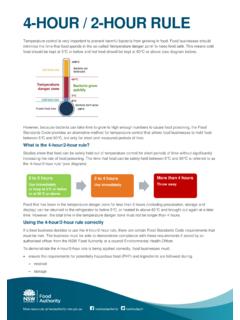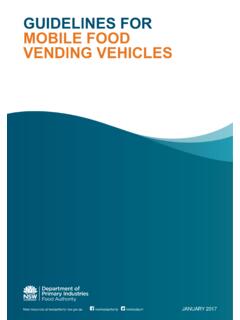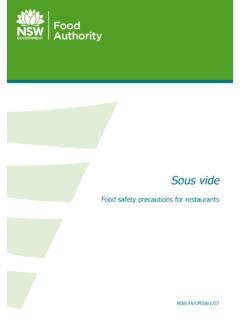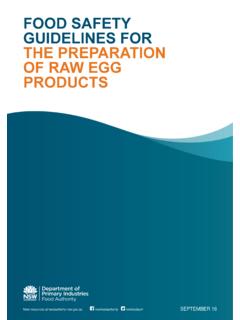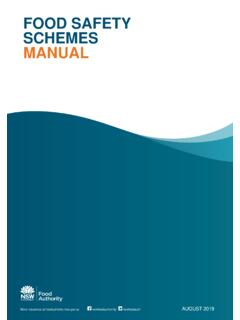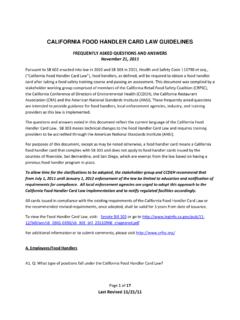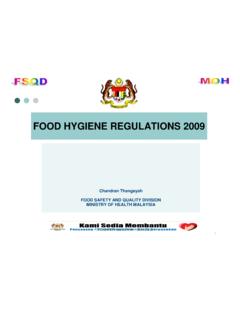Transcription of HEALTH AND HYGIENE REQUIREMENTS OF FOOD HANDLERS
1 More resources at nswfoodauthority nswfoodauth Responsibilities of food HANDLERS Under the food Standards Code, a food handler must take all reasonable measures not to handle food or food surfaces in a way that is likely to compromise the safety and suitability of food . food HANDLERS also have specific responsibilities relating to HEALTH and HYGIENE . HEALTH REQUIREMENTS Any food handler with symptoms or a diagnosis of an illness (such as vomiting, diarrhoea or fever) must: report that they are ill to their employer or supervisor not handle food if there is a reasonable likelihood of food contamination as a result of the illness if continuing to engage in other work on the food premises, take all practicable measures to prevent food from being contaminated notify a supervisor if they know or suspect they may have contaminated food .
2 Effective hand washing Hand washing is one of the most important actions you can take to prevent foodborne illness. food HANDLERS must: wash their hands using hot, soapy water and dry them thoroughly with single-use paper towels wash their hands whenever they are likely to be a source of contamination (after using the toilet, smoking, coughing, sneezing, using a handkerchief, eating, drinking or touching the hair, scalp or body) wash their hands before handling ready-to-eat food and after handling raw food . HYGIENE REQUIREMENTS food HANDLERS must: not eat, sneeze, blow, cough, spit or smoke around food or food surfaces take all practicable measures to prevent unnecessary contact with ready-to-eat food Tie back long hair, and take all practical measures to prevent hair contaminating food ensure clothing is clean cover bandages and dressings on exposed parts of the body with a waterproof covering remove loose jewellery and avoid wearing jewellery on hands and wrists.
3 Use of gloves The food Standards Code does not require food HANDLERS to use gloves. HEALTH AND HYGIENE REQUIREMENTS OF food HANDLERS A food handler is anyone who works in a food business and handles food , or surfaces that are likely to come into contact with food ( cutlery, plates). A food handler may be involved in food preparation, production, cooking, display, packing, storage or service. More resources at nswfoodauthority nswfoodauth Even when wearing gloves, in many situations it may be preferable to use utensils such as tongs or spoons. Gloves must be removed, discarded and replaced with a new pair in the below circumstances: before handling food before handling ready-to-eat food and after handling raw food after using the toilet, smoking, coughing, sneezing, using a handkerchief, eating, drinking or touching the hair, scalp or body.
4 Employer responsibilities A food business must: ensure food HANDLERS do not handle food if there is a possibility of contamination maintain easily accessible handwashing facilities and supplies of hot running water, soap and single-use paper towels ensure all food HANDLERS have appropriate skills and knowledge in food safety and food HYGIENE . This can be done either on-the-job or via formal training. food Safety Supervisor Under the food Standards Code (Standard ) all food HANDLERS must have general skills and knowledge in food safety and HYGIENE . In April 2010, a law came into effect that required certain businesses in the hospitality and retail food service sector to appoint at least one trained food Safety Supervisor (FSS). Training is tied to nationally recognised units of competency that exist within the Vocational Education and Training (VET) System.
5 To review the food Authority s food Safety Supervisor initiative, including training REQUIREMENTS , visit More information visit the website at Phone the helpline on 1300 552 406 About the NSW food Authority: The NSW food Authority is the government organisation that helps ensure NSW food is safe and correctly labelled. It works with consumers, industry and other government organisations to minimise food poisoning by providing information about and regulating the safe production, storage, transport, promotion and preparation of food . Note: This information is a general summary and cannot cover all situations. food businesses are required to comply with all of the provisions of the food Standards Code and the food Act 2003 (NSW). 6 Avenue of the Americas, Newington NSW 2127 PO Box 6682, Silverwater NSW 1811 T 1300 552 406 ABN 47 080 404 416 More resources at nswfoodauthority nswfoodauth August 2015 NSW/FA/FI041/1508

